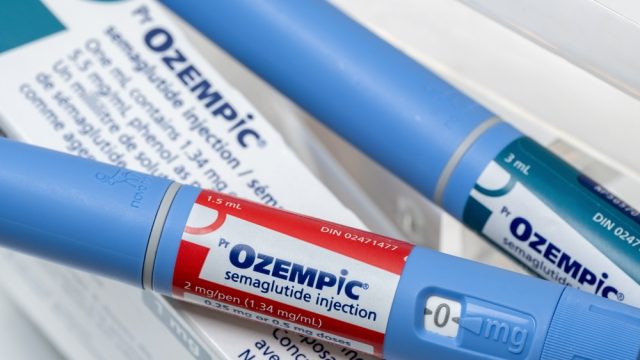Ozempic Patients Reveal Major Side Effect When You Stop Taking It

Besides weight loss, many people who’ve begun taking Ozempic have also reported a variety of side effects that come along with the drug. However, it’s not just what happens when you’re still undergoing injections that can affect you. Other Ozempic patients have revealed another major side effect that can develop when you stop taking it, too.
RELATED: Doctor Reveals Surprising New Ozempic Side Effect: “I Noticed Something Really Odd.”
In a TikTok video posted on March 5, social media personality Claudia Oshry responded to a user comment pointing out that she was showing signs of being off Ozempic, which is officially approved for managing diabetes and not specifically for weight loss. She emphatically dove into explaining the most significant change she’s noticed since stopping injections in November.
“I’m so hungry all the [expletive] time,” she tells viewers. “I’m always looking for good treats ’cause I’m still trying to lose weight, but on my own. And I’m always looking for snacks and things to fill me up.”
She then admits that she’s having trouble filling her diet with foods that will help her stop eating all the time.
“What are we eating to stay full?” she asks while grabbing a bag of snacks. “I cannot stay full—it’s impossible. I just had a 12-ounce steak. A 12-ounce steak, and I’m starving, so I’m eating popcorn. How are we staying full?!”
Oshry isn’t the only one who has reported feeling insatiably hungry after going off the popular medication. Fellow social media personality Remi Bader opened up about her struggles coming off the drug last year during an appearance on the Not Skinny But Not Fat podcast, saying she had developed a “bad binging” problem with food.
“I saw a doctor, and they were like, ‘It’s 100 percent because you went on Ozempic,'” she said, per E! News. “It was making me think I wasn’t hungry for so long. I lost some weight. I didn’t want to be obsessed with being on it long-term. I was like, ‘I bet the second I got off, I’m going to get starving again.’ I did, and my binging got so much worse. So then I kind of blamed Ozempic.”
Others have reported facing worse struggles with weight after coming off the drug than they faced before. Ozempic patient Eli Diaz says she was able to lose 22 pounds in just three months of using the medication. But when her doctors told her she had to stop using the drug due to an unrelated health issue, she quickly saw the weight come back.
“I started eating my meals completely again—and more sugary desserts and cookies. I felt more hungry [after eating a full meal],” Diaz told The New York Post last July.
RELATED: What Really Happens If You Stop Taking Ozempic, Doctors Say.
Experts say the problem with post-Ozempic hunger has to do with the drug’s effects on the body. Since it’s designed to mimic the hormone in your body that makes you feel full, stopping injections could lead to a bit of whiplash.
“Without the medication, your gastric empty time will return to baseline, which results in food being metabolized quicker and can be a trigger for you to feel hungrier faster or even requiring more food volumes to reach satiety,” Frances Lee, NP, a nurse practitioner at the weight loss center at Rush University Medical Group, told Health.
She also warns that it’s wrong for patients to assume they can simply stop taking the drug once they’ve reached their goal weight. Since the medication is intended for long-term use, it’s better to consider a controlled weaning off the drug rather than a sudden stop.
“Using Ozempic, Wegovy, and semaglutide short-term will definitely solve your short-term issues,” Lee told Health. “One may consider a lower maintenance dose, and there should be a dietary eating plan in place.”
Best Life offers the most up-to-date information from top experts, new research, and health agencies, but our content is not meant to be a substitute for professional guidance. When it comes to the medication you’re taking or any other health questions you have, always consult your healthcare provider directly.